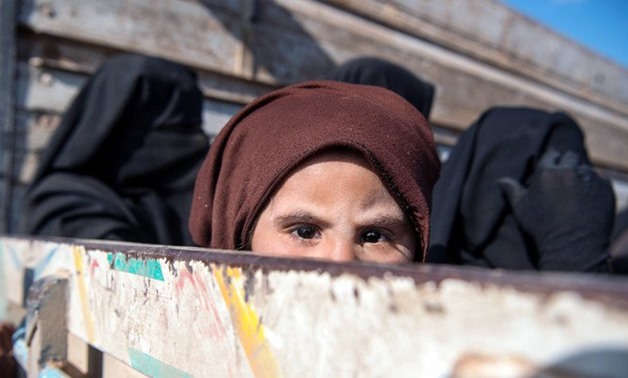
Women and children fleeing from the last Daesh group's tiny pocket in Syria sit in the back of a truck near Baghuz, eastern Syria, on Feb. 11, 2019. (AFP)
TUNIS – 13 February 2019: Officials in Tunisia have been “dragging their feet” on efforts to repatriate Tunisian children of IS group members from camps in Syria, Iraq and Libya, Human Rights Watch said Tuesday.
The rights group, quoting Tunisia’s Ministry of Women and Children, said about 200 children and 100 women claiming Tunisian nationality were being held in “squalid” camps abroad.
Many of the children are six-year-olds or younger, the rights groups said, adding that most were being held with their mothers while at least six were orphans.
Around 2,000 children and 1,000 women of 46 nationalities are being detained in prisons in Iraq and Libya and three camps in northeast Syria for ties to IS, HRW said, and Tunisia has “one of the largest contingents.”
“Tunisian officials are dragging their feet on helping bring (them) home.”
Hundreds of civilians, including IS-linked family members, have been fleeing a US-backed offensive against the militant group’s last holdout in eastern Syria.
HRW said it has interviewed family members of women and children detained in Libya and Syria, as well as government officials, human rights activists, lawyers, UN representatives and Western diplomats for its report.
The watchdog had also visited three camps in northeast Syria controlled by US-backed Kurdish forces and cited what is said were “rare calls and letters” to family members by mothers of some children.
“Legitimate security concerns are no license for governments to abandon young children and other nationals held without charge in squalid camps and prisons abroad,” said Letta Tayler, senior terrorism and counterterrorism researcher at HRW.
“Tunisian children are stuck in these camps with no education, no future, and no way out while their government seems to barely lift a finger to help them,” Tayler said.
In response Tunisia’s Foreign Ministry said it was “strongly attached to the values of human rights” and that authorities would not turn back Tunisians seeking to return home.
According to authorities in Tunis, 3,000 Tunisians have gone abroad to join militant organizations, while the UN puts the figure as high as 5,000.
Their return has been a cause of concern in Tunisia, which has been under a state of emergency following a string of IS-claimed attacks in 2015 and 2016.
In 2017, hundreds of Tunisians took to the streets to protest against the repatriation of IS-linked citizens.


Comments
Leave a Comment